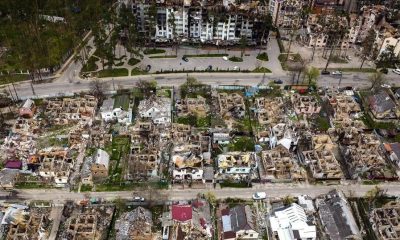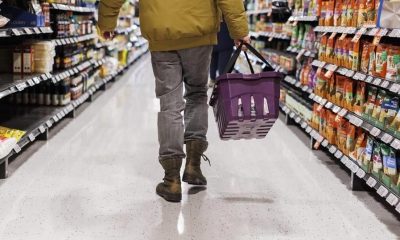Uncategorized
Centre A Brings Back the Holiday Art Market and Will Transform Gallery Space Into a Tropical Cafe for the Second Iteration of the Silent Auction

Vancouver, B.C., Canada (November 23, 2022) – Centre A: Vancouver International Centre for Contemporary Asian Art is proud to announce Tropical Cafe: 2022 Centre A Holiday Art Market, the second iteration of Centre A’s annual end-of-year event.
With the participation of over 30 local artists, we will be transforming the gallery into a cafe-like space that will be furnished with artworks submitted to us by local and regional artists. The Tropical Cafe is not only a gathering place, but also a site for exchange, ignition, and clashes of ideas and ideals.
Opening Reception:
Friday, November 26, 6 PM – 9 PM
Join us for this celebration! Many of the participating artists will be in attendance.
Location:
Unit 205, 268 Keefer Street, Vancouver, B.C., Canada, V6A 1X5
Gallery Hours:
Wednesday to Saturday, 12 PM – 6 PM
About the Event:
Tropical Cafe: 2022 Centre A Holiday Art Market: It’s that time of the year again! Centre A is bringing back its thematic Holiday Art Market after last year’s inaugural edition.
With a cold winter approaching after a warm fall, you won’t have to get on a plane to change your scenery! Come enjoy the sun and tropical vibes at Centre A and shop art for the holiday season!
This year’s theme is Tropical Cafe, and we will be transforming the gallery into a cafe-like space that will be furnished with over fifty artworks submitted to us by more than thirty talented local and regional artists. The Tropical Cafe is not only a gathering place, but also a site for exchange, ignition, and clashes of ideas and ideals.
About Centre A
Centre A is situated in Vancouver’s Chinatown, on the unceded territories of the Musqueam, Squamish, and Tsleil-Waututh peoples. We honour, respect, and give thanks to our hosts. Centre A gratefully acknowledges the support of all of our funders, donors, programming partners, and Centre A members.
Centre A is the only public art gallery in Canada dedicated to contemporary Asian and Asian-diasporic perspectives since 1999. Centre A is committed to providing a platform for engaging diverse communities through public access to the arts, creating mentorship opportunities for emerging artists/arts professionals, and stimulating critical dialogue through provocative exhibitions and innovative public programs that complicate understandings of migrant experiences and diasporic communities. In addition to our exhibition space, we house a reading room with one of the best collections of Asian art books in the country, including the Finlayson Collection of Rare Asian Art Books.
The gallery is wheelchair and walker accessible. If you have specific accessibility needs, please contact us at +1 (604) 683-8326 or info@centrea.org.
Subscribe to Centre A’s newsletter here.
– 30 –
Media Contact
Dyana Kim
—
Uncategorized
The Booming Business of Online Casinos: A Look at Current Trends


Photo: https://unsplash.com/photos/red-playing-cards-kpY9410Ha2s
In the ever-evolving landscape of the gambling industry, online casinos have emerged as a powerhouse, captivating millions of players worldwide. This trend is particularly evident in Canada, where the online casino market has experienced significant growth in recent years. Let’s delve into the latest business news and trends shaping the world of online casinos.
Rise in Demand and Revenue
The online casino business has been on a steady upward trajectory, fueled by the increasing demand for convenient and accessible gambling options. With advancements in technology and the widespread availability of high-speed internet, Canadians are embracing online casinos as a preferred mode of entertainment. This surge in demand has translated into substantial revenue growth for operators, with many reporting record-breaking profits in recent quarters. If you’re interested in checking out what the online casino industry has to offer, check out https://luckycasino.com/en/ to find interesting and innovative ideas in the iGaming industry.
Expansion of the Market
One notable trend in the online casino industry is the expansion of the market to new demographics and regions. Traditionally, online gambling was associated with younger demographics, but there has been a noticeable shift in recent years. Older adults, in particular, are increasingly turning to online casinos for entertainment, contributing to the diversification of the player base. Additionally, with the legalization of online gambling in certain provinces and the growing acceptance of digital currencies like Bitcoin, the market is poised for further expansion.
Technological Advancements
Technology continues to play a pivotal role in shaping the online casino landscape. From state-of-the-art gaming platforms to innovative payment solutions, operators are constantly striving to enhance the user experience. Virtual reality (VR) and augmented reality (AR) technologies are also being integrated into online casinos, offering players a more immersive and interactive gaming experience. These technological advancements not only attract new players but also foster loyalty among existing customers.
Regulatory Challenges and Compliance
Despite its rapid growth, the online casino industry is not without its challenges, particularly in terms of regulation and compliance. As governments around the world grapple with the complexities of online gambling, regulatory frameworks continue to evolve. In Canada, for example, the legality of online gambling varies by province, leading to inconsistencies in regulations and enforcement. Operators must navigate a complex web of laws and regulations to ensure compliance, which can be a daunting task.
The Impact of COVID-19
The COVID-19 pandemic has had a profound impact on the online casino industry, both positively and negatively. On one hand, lockdown measures and social distancing restrictions have driven more people to seek entertainment options online, leading to a surge in demand for online casinos. On the other hand, economic uncertainty and job losses have affected consumer spending, prompting some players to cut back on discretionary expenses like gambling. Overall, the net effect of the pandemic on the online casino business remains to be seen.
Looking Ahead
As we look to the future, the online casino industry shows no signs of slowing down. With continued technological innovations, evolving consumer preferences, and shifting regulatory landscapes, the business of online casinos is poised for further growth and transformation. For players and operators alike, staying abreast of the latest trends and developments will be crucial in navigating this dynamic and ever-changing industry landscape.
In conclusion, the world of online casinos presents a myriad of opportunities and challenges for businesses and players alike. With its growing popularity and profitability, the online casino industry is undoubtedly a force to be reckoned with in the global gambling market.
News
Migrant Justice Organizations and South Asian Diaspora Groups from Across Canada in Support of Permanent Solution for International Students of Indian Origin
Calgary, Edmonton, Montreal, Toronto, Vancouver, Winnipeg, June 20, 2023 – Almost twenty Migrant Justice Organizations and South Asian Diaspora Groups from across Canada urge Immigration, Refugees and Citizenship Minister, Sean Fraser, to put a definite stop to the deportation of scores of international students from India.“These students entered Canada like any other international students and they should not have to bear the burden of proof because of fraud committed by immigration consultants and education recruiters” stated the joint letter. Receiving deportation orders and the precarity of having to live with a constant threat of being separated from their families and uprooted from their communities and the associated struggle and turmoil is a painful process and is punishment in itself.For over two weeks, from May 28, students, their supporters and community members had set up a permanent protest in front of the CBSA headquarters in Mississauga. While this protest now ended with your announcement on June 14 to halt the deportations, students continue to express their concerns over the next steps in this process. Migrant Justice Organizations and South Asian Diaspora Groups stand in solidarity with the students and believe there can be no justice until their demands are met, which are: a permanent solution to the situation, a definitive cancellation of the deportations, and granting them permanent resident status. Nothing short of this is acceptable.These individuals who arrived in Canada as international students call Canada home and have become integral parts of our lives. They are an asset to our communities and should be living here without any hassle or threat of deportation.Deportations are a long standing form of institutional racism, and are manifested in the violent and coercive practices of the state. This situation is yet another example of how the Canadian immigration system and CBSA fail people and produce undocumented migrants. This is why regularization is necessary. Just like Migrant Justice and hundreds of civil society groups across Canada, the signatories of the joint letter call for a comprehensive, inclusive and ongoing regularization program for all people with precarious status. All migrants should be given permanent resident status on arrival. Migrants already here must be granted permanent residency.Close to twenty groups that signed the joint letter urge the minister to take prompt and decisive action to provide a permanent solution, and immediate regularization and permanent resident status for these students and all undocumented people across Canada. Without this, there can be no justice.Status for All, Dignity for All!Signatories of the joint letter:Butterfly (Asian and Migrant Sex Workers Support Network), TorontoCentre sur L’Asie du Sud (CERAS), MontréalImmigrant Workers Centre/Centre Des Travailleurs Et Travailleuses Immigrants (IWC-CTTI), MontréalIndia Civil Watch – International, TorontoMigrante Alberta, EdmontonParkdale Community Legal Services, TorontoProgressive Cultural Association, CalgaryPro-People Arts Project Media Group (Sarokaran Di Awaz), TorontoPunjabi Literary and Cultural Association, WinnipegQuebec Public Interest Research Group – Concordia University (QPIRG), MontréalRang Collective: Arts for Solidarity/Collectif Rang: Les Arts pour la Solidarité, MontréalShaheed Bhagat Singh Book Centre, CalgarySolidarity Across Borders, MontréalSouth Asian Dalit Adivasi Network – Canada, TorontoSouth Asian Diaspora Action Collective (SADAC), MontréalSouth Asian Network for Secularism and Democracy (SANSAD), VancouverSouth Asian Women’s Community Center/Centre Communautaire Des Femmes Sud-Asiatiques (SAWCC-CCFSA), MontréalTeesri Duniya Theatre, MontréalWorkers’ Action Centre, TorontoCC Standing Committee on Citizenship and Immigration:Shafqat Ali, MPAlexis Brunelle-Duceppe, MPSukh Dhaliwal, MPFayçal El-Khoury, MPArielle Kayabaga, MPTom Kmiec, MPJenny Kwan, MPMarie-France Lalonde, MPLarry McGuire, MPHon. Michelle Rempelle Garner, MPBrad Redekopp, MPSalma Zahid, MP
Uncategorized
Federal budget 2022: Highest-earning Canadians face minimum tax rate increase

The federal government is moving to raise the minimum tax rate paid by wealthy Canadians in the budget and narrowing its focus on the highest earners.
In its budget Tuesday, Ottawa is raising the alternative minimum tax rate and imposing new limits on many of the exemptions, deductions and credits that apply under the system starting in 2024.
“We’re making sure the very wealthy and our biggest corporations pay their fair share of taxes, so we can afford to keep taxes low for middle-class families,” Finance Minister Chrystia Freeland said in the prepared text of her remarks.
The alternative minimum tax (AMT) introduced in 1986 is a parallel income tax calculation that allows fewer deductions, exemptions and tax credits than the ordinary tax rules for the country’s highest earners. Wealthy Canadians pay the alternative minimum or regular tax, whichever is higher.
The government announced in the budget that it is increasing the alternative minimum rate to 20.5 per cent from 15 per cent starting in 2024.
To help ensure lower- and middle-income Canadians don’t get caught up in the increase, Ottawa is also proposing to increase the exemption to the start of the fourth federal tax bracket from $40,000. For 2024, it expects the exemption would be about $173,000 and be indexed annually to inflation.
The government estimates that under the new rules about 32,000 Canadians will be covered by alternative minimum tax in 2024, compared with about 70,000 if it did not make the changes.
However, the higher rate and revamping of the allowable deductions and credits mean Ottawa expects to take in an additional $150 million in 2023-24 and an additional $625 million in 2024-25.
Bruce Ball, vice-president for tax at CPA Canada, said there is a broader range of things that will go into the alternative minimum tax calculation, but the good news for most taxpayers is that the threshold will be much higher.
“That should exclude a lot of people even if they have more add-backs than they would have under the old system, so there’s some good news and bad news I guess, depending on your situation,” Ball said.
“If you’re higher income you may end up paying more; if you’re lower income you may not be subject to AMT.”
While the richest Canadians face the possibility of higher taxes, the budget also includes a one-time payment for those who receive the goods and services tax credit to help offset the rising cost of living.
“We all know that our most vulnerable friends and neighbours are still feeling the bite of higher prices. And that is why our budget delivers targeted inflation relieve to those who need it most,” Freeland said.
Under the proposal billed as a grocery rebate, Canadians who are eligible will receive an additional amount equal to twice the GST tax credit amount for January. For couples with two children the amount could be up to $467, while a single Canadian without children could receive up to an extra $234.
Student budgets will also see a boost from the budget as the government increases the Canada Student Grants compared with pre-pandemic levels and raises the interest-free Canada Student Loan limit.
The changes increase the total federal aid available to a full-time student based on financial need to $14,400 for 2023, up from $13,160 for 2022 and $10,140 in 2019 before the pandemic.
The government is also moving to cap the increase on alcohol excise duties to two per cent for one year. Ordinarily, the rates are indexed to the consumer price index and were previously set to rise by 6.3 per cent.
However, Canadians looking to take a flight next year will face an increase in the air travellers security charge paid by those flying in Canada starting on May 1, 2024. The charges, which are paid by passengers when they buy an airline ticket, help pay for the air travel security system and were last increased in 2010.
The charge for a domestic round trip will rise to $19.87, from its current rate of $14.96. The charge for a transborder flight to the U.S. will rise to $16.89 from $12.71, while for departing international flights travellers will pay $34.42, up from $25.91.
This report by The Canadian Press was first published March 28, 2023.
-

 News17 hours ago
News17 hours agoTrudeau heads to G20 in Brazil as Canada crafts approach to emerging countries
-

 News5 hours ago
News5 hours agoTrial to begin in human smuggling case after freezing deaths of Indian family at Canada-US border
-

 News16 hours ago
News16 hours agoRussia grinds deeper into Ukraine after 1,000 days of grueling war
-

 News16 hours ago
News16 hours agoBig voter turnout this year benefited Republicans, contradicting conventional political wisdom
-

 News16 hours ago
News16 hours agoOctober inflation expected to show mild bump up despite longer-term downward trend
-

 News17 hours ago
News17 hours agoNova Scotia Liberal Leader Zach Churchill’s passion for politics started early
-

 News5 hours ago
News5 hours agoWisconsin Supreme Court hearing case targeting swing state’s top elections administrator
-

 News5 hours ago
News5 hours agoTrump names Brendan Carr, senior GOP leader at FCC, to lead the agency




















